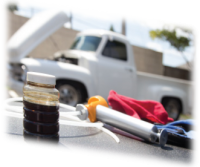
Have you ever said to yourself, “I’ll do a pre-trip inspection next week when I have more time?” Did you get that nagging feeling in the pit of your stomach that you should perform it daily as you’re supposed to? If so, read the story below from CCJ Commercial Carrier Journal – Fleet Management Magazine:
FMCSA Shuts Down Small Reincarnated Carrier
Daya Trucking, a Georgia-based 39-truck fleet, has been effectively shut down by the Federal Motor Carrier Safety Administration for reincarnating after being given an “Unsatisfactory” safety rating in 2017. According to FMCSA, Daya was formerly known as Ekam Truck Line. In 2017, Ekam agreed to enter a Consent Order in order to upgrade its safety rating from Unsatisfactory to Conditional. The fleet’s Unsatisfactory rating was the result of a number of safety violations, FMCSA says. The Consent Order required Ekam to take specific actions to improve safety, however, the company performed none of these actions, FMCSA adds, and instead evaded the order by applying for U.S. DOT registration as Daya Trucking. Following an investigation, FMCSA reinstated Ekam’s Unsatisfactory rating and merged and consolidated the safety and enforcement records of Ekam and Daya.
Vehicle Maintenance Violations
In the past 12 months, Daya vehi-cles had been placed out-of-service at a rate of 46 percent and cited for:
1. inoperable lamps
2. exposed tire fabric
3. defective brakes
4. broken or missing axle position components
5. oil or grease leaks from hubs
6. Failing to ensure drivers were properly licensed
7. Investigators found where five drivers without a current CDL or in possession of a suspended CDL had been dispatched
Source: CCJ Commercial Carrier Journal – Fleet Management Magazine

Why is it important to give your equipment a routine physical? For humans, a blood test is part of a routine physical. You may feel fine, but a blood test will reveal more about your health than what a doctor can see. Likewise, testing fluids in your equipment tells a lot about its condition. Oil samples can reveal things about your vehicle that can not be seen by the naked eye.
Oil analysis is most effective as a diagnostic tool when samples are taken from the equipment at established and scheduled intervals to create a trend of results. In time, the load of worn materials begins affecting the oil’s lubricating capability. This cannot be detected by driver or mechanic, but only by an oil sample.
By early identification of contamination and wear particles, possible component failure can be predicted. This can significantly reduce costs by identifying a simple solution before a major failure occurs. If you know something is wrong, it can be repaired before a major break down.
After the repairs are made it is important to retest the equipment. A recent example I encountered was a vendor who made a repair and did not change the oil. If another oil sample had not been taken, surely an engine would have been lost.
Two Things that make Oil Samples Ineffective:
- Oil samples not performed routinely.
- Oil samples should be taken at regular monthly intervals to catch abnormalities.
- Lack of information while turning in your oil sample.
- The paperwork must be filled out completely and correctly for the oil sample to be tracked properly.
If you are interested in learning more about the oil analysis program at Wisconsin Truck & Boom Repair, just give us a call. We assure you that this approach, along with a good preventative maintenance program, will save you time and money in the end.
“Oil samples can reveal things about your vehicle that can not be seen by the naked eye.”
